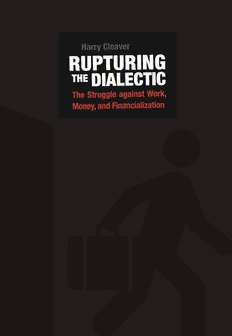
Rupturing the Dialectic: The Struggle against Work, Money, and Financialization PDF
Preview Rupturing the Dialectic: The Struggle against Work, Money, and Financialization
RUPTURING THE DIALECTIC The Struggle against Work, Money, and Financialization Harry Cleaver RUPTURING THE DIALECTIC The Struggle against Work, Money, and Financialization Rupturing the Dialectic: The Struggle against Work, Money, and Financialization © 2017 Harry Cleaver This edition © 2017 AK Press (Chico, Oakland, Edinburgh, Baltimore) ISBN: 978-1-84935-270-3 E-ISBN: 978-1-84935-271-0 Library of Congress Control Number: 2016954842 AK Press AK Press 370 Ryan Ave. #100 33 Tower St. Chico, CA 95973 Edinburgh EH6 7BN USA Scotland www.akpress.org www.akuk.com [email protected] [email protected] The above addresses would be delighted to provide you with the latest AK Press distribution catalog, which features books, pamphlets, zines, and stylish apparel published and/or distributed by AK Press. Alterna- tively, visit our websites for the complete catalog, latest news, and secure ordering. Cover design by Kate Khatib / Owl Grammar Press. Exit icon by Rediffusion from the Noun Project. Printed in the USA on acid-free, recycled paper. TABLE OF CONTENTS Preface 1 Introduction 15 PART I: On the Usefulness of Marx’s Labor Theory of Value 29 Why and How Economists Got Rid of the Labor Theory of Value 31 Why and How Some Marxists Abandoned the Labor Theory of Value 39 The Substance of Value: Abstract Labor or Work as Social Control 71 Can Value be Measured? 87 Exchange and Money as the Form of Value 107 PART II: Decoding Finance, Financial Crisis, and Financialization 143 Decoding Finance and Financial Crisis 145 Decoding Financialization 181 PART III: Potential Strategies and Tactics for Rupturing the Dialectics of Money 227 Reforms and Revolution 235 Our Use of Money 243 Restricting the Need for Money 255 Conclusion 265 Bibliography 291 Index 309 PREFACE My objective with this book is to share some thoughts. I wrote it, not to convince and convert those whose ideas differ, but to contri- bute to an ongoing conversation about the world we live in, what we don’t like about it and how we would like to change it. That said, the thoughts I share here are by no means comprehensive; they do not deal with everything we don’t like or with all possible means of change. Nor do they specify many details about the nature of the new worlds we are striving to create as we experiment with ways to transcend the present situation. Their focus, rather, is fairly narrow. They are preoccupied with what I consider fundamental elements of the existing system that confines and limits us, elements that must be eliminated if we are to achieve more comprehensive change that will craft worlds closer to our hearts’ desires. Frequently in this book I use the first-person plural pronouns “we” and “our”—despite recognizing them as problematic. Some- times they refer to all living beings, as in “our very existence is threatened by the way capitalist industry poisons land, air, and wa- ter”; sometimes they refer to all of us who struggle against the way capitali sm organizes society, as in “we struggle against the subordi- nation of our lives to capitalist imposed work.” My use of these terms, however, should not be read as a reductionism that ignores the complex heterogeneity of either living beings or of those of us who struggle. As I hope will be clear in what follows, I am acutely aware of those complexities and make no pretense of speaking for specific groups of which I am clearly not a member. Yet I use these terms because I want to avoid the academic practice of analyzing conflict from outside and above, as if an objective observer, by being clear that what I have to say here is one expression of my political stance among those opposed to capitalism and striving to create al- ternatives. I also use these pronouns, where it seems reasonable to do so, to emphasize how capitalist ways of organizing the world im- pose common problems on us and how we have often found in the past, and can hopefully find in the future, complementary ways to struggle. I juxtapose complementarity in struggle to more tradition- al evocations of unity. For me, complementarity implies the critical embrace of differences (not just acceptance or tolerance), both in
